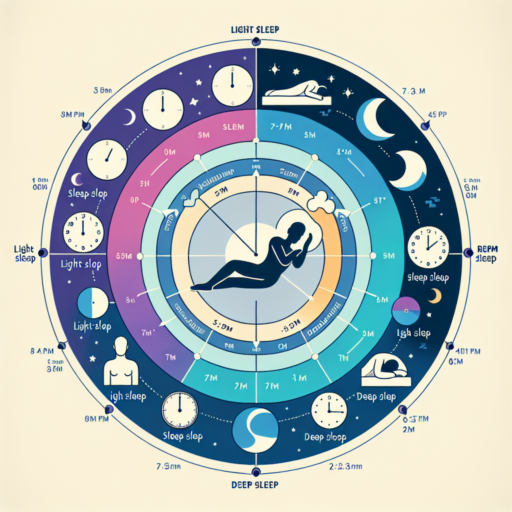Understanding the Importance of Deep Sleep
Deep sleep, the phase of sleep also known as slow-wave sleep, plays a critical role in our overall health and well-being. It’s during this stage of sleep that our bodies and minds undergo the most regeneration and recovery. This phase is essential for muscle growth, tissue repair, and the strengthening of the immune system. Moreover, deep sleep is crucial for cognitive functions, impacting memory consolidation and emotional regulation.
The quality of deep sleep can significantly influence our daytime performance. Lack of deep sleep can lead to feelings of lethargy, decreased concentration, and impaired judgement. This highlights the necessity of not only focusing on the quantity of sleep but also prioritizing its quality. Additionally, the role of deep sleep in hormone regulation, including the production of growth hormone and the regulation of insulin and cortisol levels, cannot be understated. These hormonal adjustments are pivotal for energy metabolism and stress management.
Improving the quality of deep supports overall health and well-being. Strategies such as maintaining a consistent sleep schedule, creating a restful sleep environment, and minimizing exposure to blue light before bedtime can enhance the proportion of deep sleep achieved each night. This underscores the importance of adopting healthy sleep habits to ensure that the body and mind are fully replenished.
How Much Deep Sleep Do You Really Need?
Understanding the importance of deep sleep is crucial for optimizing your health and wellness. Deep sleep, also known as slow-wave sleep, plays a pivotal role in your body’s ability to repair itself, consolidate memory, and refresh your mind for the next day. The question of «How much deep sleep do you really need?» can vary from person to person, but there are some general guidelines that can help ensure you’re getting the restorative sleep your body requires.
According to the National Sleep Foundation, adults should aim for about 7-9 hours of sleep per night, with deep sleep constituting approximately 13-23% of this time. This translates to roughly 1 to 2 hours of deep sleep every night. However, it’s important to remember that sleep needs can fluctuate based on factors like age, lifestyle, and overall health. For instance, children and teenagers typically require more deep sleep than adults do due to the critical role it plays in their growth and development.
Factors that can affect the quality and quantity of your deep sleep include stress levels, your bedroom environment, and your lifestyle choices. Strategies to increase deep sleep range from establishing a bedtime routine to creating a comfortable and quiet sleep environment. Limiting exposure to screens before bed, reducing caffeine intake, and engaging in regular physical activity can also contribute to a better night’s rest.
Factors Influencing Your Amount of Deep Sleep
Understanding the factors that influence the amount of deep sleep you get each night is crucial for achieving restorative rest. Deep sleep plays a vital role in your overall health, aiding in recovery, memory consolidation, and energy restoration. Several key factors can affect how much deep sleep you are able to achieve. Recognizing these can help you make informed adjustments to your lifestyle for better sleep quality.
Diet and Nutrition
Your diet has a significant impact on your sleep patterns. Consuming heavy or large meals close to bedtime can disturb your sleep cycle, reducing the time spent in deep sleep. Similarly, caffeine and alcohol intake can also influence your sleep quality. Caffeine, a stimulant, can delay the timing of your body clock, making it harder to fall into deep sleep stages. On the other hand, while alcohol might make you feel drowsy, it can heavily fragment your sleep, decreasing the total time spent in deep sleep.
Sleep Environment and Habits
The environment in which you sleep plays a substantial role in determining the quality of your rest. Factors such as temperature, noise, and light can greatly interfere with your ability to fall asleep and progress into the deeper, more restorative stages of sleep. Creating a sleep environment that is quiet, dark, and cool can facilitate a smoother transition into deep sleep. Furthermore, establishing a consistent sleep schedule and routine can signal your body to prepare for rest, enhancing your chances of achieving adequate deep sleep.
Stress and Mental Health
Stress and mental health conditions such as anxiety and depression can have a profound impact on your sleep quality. The state of your mental health influences your ability to relax and fall asleep, including your capacity to enter deep sleep phases. Techniques such as mindfulness, meditation, and cognitive-behavioral therapy can be effective in managing stress and improving sleep quality, thereby increasing the duration of deep sleep you experience each night.
Signs You’re Not Getting Enough Deep Sleep
Identifying the signs that you’re not getting enough deep sleep is crucial for your physical and mental health. Deep sleep, also known as delta sleep, is the stage of sleep that allows for muscle growth, tissue repair, and the replenishing of your energy reserves. A lack of deep sleep can have immediate and long-term impacts on your wellbeing.
Constant Fatigue and Tiredness
One of the most noticeable signs that you’re not getting enough deep sleep is a pervasive sense of fatigue and tiredness during the day. This doesn’t just mean feeling a little sleepy; it’s a deep, unshakable fatigue that affects your ability to focus, be productive, and enjoy life. If you’re getting enough hours of sleep but still feel exhausted, you might not be spending enough time in deep sleep stages.
Mood Swings and Irritability
Lack of deep sleep can also have a significant impact on your mood. If you find yourself more irritable or experiencing mood swings more frequently, it might be a sign that you’re not getting the restorative sleep your body and mind need. Deep sleep plays a vital role in emotional regulation, and without it, even the smallest annoyances can seem insurmountable.
Recognizing these signs early and taking steps to improve your sleep quality can prevent the negative effects of sleep deprivation from taking a toll on your health and daily life. Adjusting your sleep environment, routine, and habits are among the strategies that can enhance your deep sleep stages, ensuring you wake up feeling rested and recharged.
Effective Strategies to Increase Your Deep Sleep
Deep sleep is crucial for overall health, playing a key role in physical recovery, mental clarity, and emotional regulation. Implementing effective strategies can significantly enhance the quality and duration of your deep sleep phase. Below, we’ll explore proven methods to enhance your deep dive into restorative slumber.
Establish a Consistent Sleep Schedule
Regularity is the backbone of improving deep sleep. Going to bed and waking up at the same time every day sets your body’s internal clock, optimizing sleep quality. Consistency in your sleep schedule, even on weekends, helps to increase the amount of deep sleep you get each night.
Optimize Your Sleep Environment
Crafting a sleep-conducive environment is essential for slipping into deep sleep. Your bedroom should be a sanctuary designed for relaxation and rejuvenation. Consider the following adjustments for an optimal sleep setting:
- Temperature: Maintain a cool, comfortable temperature, ideally around 65°F (18°C).
- Light: Minimize exposure to light sources; consider blackout curtains or an eye mask.
- Noise: Reduce ambient noise levels with earplugs or white noise machines.
Limit Exposure to Blue Light
In today’s digital age, our evenings are often illuminated by screens, leading to excessive exposure to blue light, which can disrupt natural sleep patterns. Limiting screen time at least an hour before bed can foster a quicker transition to deep sleep. Opt for reading a book or practicing relaxation exercises like meditation or gentle yoga to unwind effectively.
No se han encontrado productos.
The Link Between Deep Sleep and Overall Health
Understanding the connection between deep sleep and overall health is crucial in a society where sleep is often undervalued. Deep sleep, or slow-wave sleep, plays a pivotal role in several physiological processes that are vital for rejuvenating the body and promoting optimal health. Research consistently links quality deep sleep with a myriad of health benefits, indicating its critical function in our daily lives.
Deep sleep is instrumental in the process of physical recovery and regeneration. It’s during this phase that the body repairs tissues, builds bone and muscle, and strengthens the immune system. Furthermore, deep sleep aids in the management of stress and anxiety, highlighting its significance beyond just physical wellness. These restorative processes underscore the essential need for deep sleep in maintaining a robust immune response and a balanced psychological state.
Key Health Benefits of Deep Sleep
- Enhanced Immune Function: During deep sleep, the body produces cytokines, a type of protein that fights off infections and inflammation, reducing the likelihood of illness.
- Improved Memory and Concentration: Deep sleep plays a critical role in memory consolidation, the process by which short-term memories are transformed into long-term ones, significantly impacting learning and cognitive function.
- Regulation of Weight: Sleep influences hormones that control appetite, and deep sleep balances those hormones. Poor deep sleep patterns can contribute to weight gain and obesity.
The intricate link between deep sleep and overall health underscores the necessity of prioritizing sleep as much as diet and exercise in one’s lifestyle. Ignoring the quality of sleep can have profound effects on health and well-being, reaffirming the critical role of deep sleep in the foundation of good health.
Monitoring Your Deep Sleep: Tools and Technologies
Understanding the quality of your deep sleep is pivotal to enhancing overall health and well-being. In today’s fast-paced world, numerous tools and technologies have been developed to monitor this crucial aspect of your sleep cycle. These advancements not only offer insights into your sleep patterns but also provide recommendations to improve sleep quality.
Wearable Sleep Trackers
One of the most popular methods to monitor deep sleep is through wearable sleep trackers. These devices, often worn on the wrist, track various physiological parameters such as heart rate, movement, and breathing patterns throughout the night. Advanced models can differentiate between light, deep, and REM sleep stages, providing users with a comprehensive analysis of their sleep quality.
Smart Mattresses and Pillows
Another innovative approach to monitoring deep sleep involves smart mattresses and pillows. These products are equipped with sensors that detect changes in pressure and motion, offering a non-intrusive way to analyze sleep quality. They can track how often you toss and turn, record your heartbeat, and even monitor your breathing rate. By collecting and analyzing this data, smart mattresses and pillows can help identify patterns and suggest improvements for deeper, more restful sleep.
Deep Sleep vs. Other Sleep Stages: What’s the Difference?
Understanding the various sleep stages is crucial for recognizing the unique role each one plays in our overall sleep health. Deep sleep, or slow-wave sleep, significantly differs from other stages in terms of brain wave patterns, physical rest, and the process of healing and regeneration. Let’s delve into the specifics to learn what sets deep sleep apart.
Brain Wave Patterns and Physical Rest
During deep sleep, the brain produces slow waves known as delta waves, which are markedly different from the faster waves observed in lighter sleep stages. This period of slow-wave sleep is critical for physical rest and recovery, as the body takes this time to repair muscles, tissues, and replenish energy stores. Deep sleep stands in contrast to lighter stages, such as REM (Rapid Eye Movement) sleep, where the brain is almost as active as it is while awake, playing a vital role in memory consolidation and learning.
The Role in Healing and Regeneration
The significance of deep sleep extends beyond simple rest; it’s a phase where key regeneration processes occur, including hormone release such as growth hormones essential for growth and muscle repair. This stage also strengthens the immune system and supports healthy brain function. Other sleep stages, while beneficial for mental health and cognitive processes, do not provide the same level of physical healing.
In summary, while all sleep stages are important for a healthy sleep cycle, deep sleep is particularly impactful for its role in physical repair and recovery. It’s this stage that prepares us both physically and mentally for the day ahead, highlighting the importance of quality sleep for overall health and well-being.
Common Myths About Deep Sleep Debunked
Deep sleep, a critical phase of our sleep cycle, is enveloped in various myths and misconceptions that often mislead people about its nature and importance. Understanding the nuances of deep sleep can greatly enhance one’s overall health and sleep quality. In this examination, we aim to clarify some of the most pervasive myths surrounding deep sleep.
Myth 1: More Deep Sleep Equals Better Sleep Quality
One common misconception is that the measure of good sleep directly correlates with the amount of deep sleep one gets. While deep sleep is essential for physical restoration and memory consolidation, an excess is not necessarily indicative of better sleep quality. Balance across all sleep stages is key for a restful night and overall health. It’s the quality, not just the quantity, of each sleep phase that matters most.
Myth 2: Deep Sleep Should Occupy Most of the Sleep Cycle
Another myth suggests that deep sleep should dominate the sleep cycle. In reality, deep sleep only constitutes about 20% to 25% of an adult’s sleep cycle, with the remainder of the cycle consisting of light sleep and REM stages. Each stage of the sleep cycle plays a unique and crucial role, and the optimal distribution across these stages is what promotes a healthy sleep pattern.
Myth 3: Older Adults Need Less Deep Sleep
It is often believed that as people age, their need for deep sleep decreases. However, the need for deep sleep does not significantly diminish with age; rather, the ability to easily enter deep sleep phases might be reduced. This misunderstanding underscores the importance of maintaining sleep hygiene practices to promote better deep sleep regardless of age.
Improving Your Sleep Quality: A Holistic Approach
Enhancing your sleep quality is vital for overall health and well-being, but it often requires a holistic approach that encompasses a variety of strategies. This method involves not just looking at one aspect of your routine but evaluating and adjusting multiple areas of your life to foster better sleep. From optimizing your sleep environment to understanding the roles of diet and exercise, a multi-faceted plan can significantly improve the quality of your rest.
Nutrition and Sleep: The connection between what you eat and how well you sleep is profound. Consuming caffeine or sugary foods too close to bedtime can disrupt your sleep cycle, making it harder to fall asleep or stay asleep. Incorporating foods rich in magnesium and melatonin, such as almonds, walnuts, and cherries, can naturally prepare your body for a restful night.
Exercise and its Impact on Sleep: Regular physical activity is another cornerstone of better sleep, though timing is key. Engaging in vigorous exercise too close to bedtime can be counterproductive, as it energizes the body instead of calming it. Planning your workout sessions for earlier in the day can help enhance the depth and duration of your sleep, making you feel more restored and rejuvenated in the morning.




